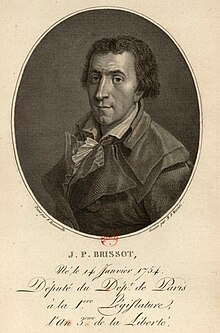Jacques Pierre Brissot
| Jacques Pierre Brissot de Warville | |
|---|---|
 |
|
| Deputy of the National Convention | |
|
In office 20 September 1792 – 30 October 1793 |
|
| Personal details | |
| Born |
Jacques Pierre Brissot 15 January 1754 Chartres, France |
| Died | 31 October 1793 (aged 39) Place de la Révolution, Paris, France |
| Cause of death | Guillotine |
| Resting place |
Chapelle Expiatoire, Paris, France 48°52′25″N 2°19′22″E / 48.873611°N 2.322778°ECoordinates: 48°52′25″N 2°19′22″E / 48.873611°N 2.322778°E |
| Nationality | French |
| Political party |
Jacobin Club (1789–1793) The Gironde (1791–1793) |
| Spouse(s) | Félicité Dupont (m. 1759–93), his death |
| Occupation | Journalist, writer, publisher, politician |
| Signature | |
Jacques Pierre Brissot (15 January 1754 – 31 October 1793), who assumed the name of de Warville (An English version of Ouaraville, a village where his father owned property), was a leading member of the Girondist movement during the French Revolution. Some sources give his name as Jean Pierre Brissot.
Brissot was born at Chartres, where his father was an innkeeper. He received an education and entered the office of a lawyer at Paris. He married Félicité Dupont (1759–1818), who translated English works, including Oliver Goldsmith and Robert Dodsley. They lived in London, and had three children. His first works, Théorie des lois criminelles (1781) and Bibliothèque philosophique du législateur (1782), dealt with philosophy of law topics, and showed the deep influence of ethical precepts theoretised by Jean-Jacques Rousseau. In the preface of Théorie des lois criminelles, Brissot explains that he submitted an outline of the book to Voltaire and quotes his answer from 13 April 1778.
Brissot became known as a writer and was engaged on the Mercure de France, the Courrier de l'Europe and other papers. Devoted to the cause of humanity, he proposed a plan for the collaboration of all European intellectuals and started in London a paper, Journal du Lycée de Londres, which was to be the organ of their views. The plan was unsuccessful. Soon after his return to Paris, Brissot was placed in the Bastille in 1784 on the charge of having published a pornographic pamphlet Passe-temps de Toinette against the queen.
He obtained his release after four months and again devoted himself to pamphleteering, most notably his 1785 open letter to emperor Joseph II of Austria, Seconde lettre d'un défenseur du peuple a l'Empereur Joseph II, sur son règlement concernant, et principalement sur la révolte des Valaques, which supported the right of subjects to revolt against the misrule of a monarch, and was on account of this forced to retire for a time to London. On this second visit, he became acquainted with some of the leading abolitionists and founded in Paris an anti-slavery group Society of the Friends of the Blacks, of which he was president during 1790 and 1791.
...
Wikipedia
